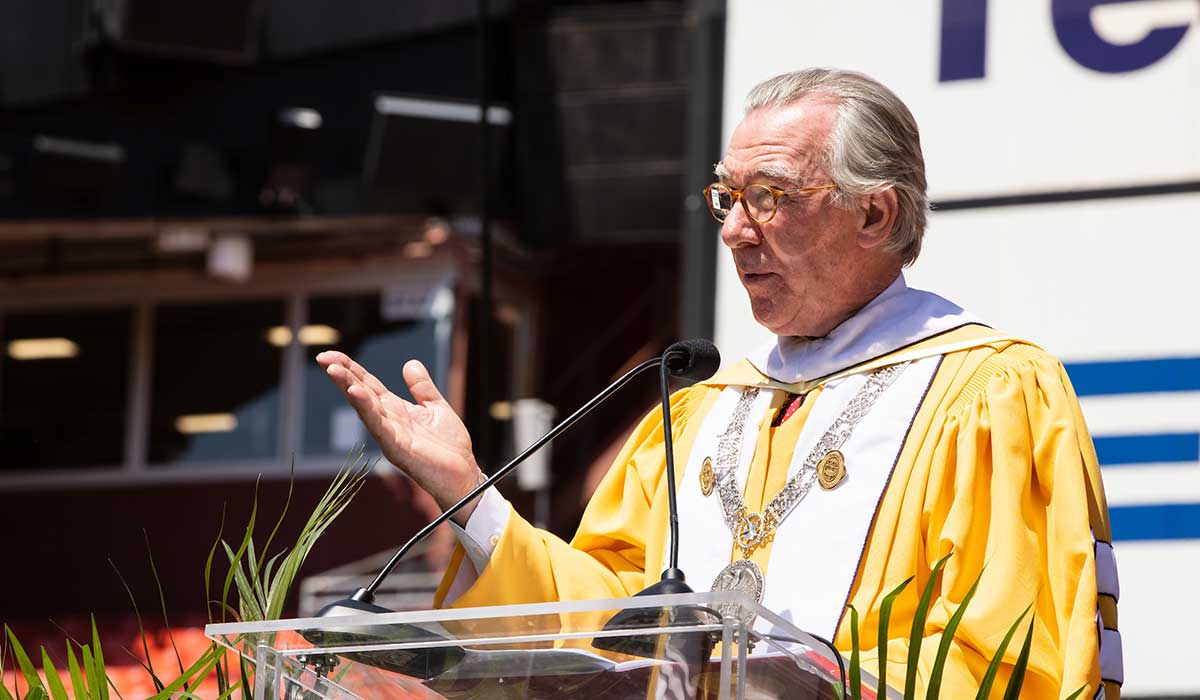
John Garvey, President of The Catholic University of America
Commencement Remarks
132nd Annual Commencement
FedEx Field
Greater Landover, Md.
May 15, 2021

Perhaps some of you saw the recent announcement by the National Center for Health Statistics, that the number of babies born in the U.S. in 2020 was down 4% from 2019. This was the sixth consecutive year the number of births declined. America’s overall fertility rate is now at 1.64, the lowest level since we began keeping track a century ago, and well below replacement rate (2.1).
This got me thinking it’s a lucky thing your parents didn’t take such a dim view of reproduction. If the fertility rate had been 1.64 at the turn of the century, 239 of you wouldn’t be here. Just to give you an idea what that means, it would be as though everyone from John Abbruzzi through Christian Coleman had never been born and wouldn’t be graduating today. It also got me thinking about gratitude, an appropriate virtue for an occasion like this.
Gratitude is not just an emotion. We are always grateful for something – a sunny day, a loving family, an education. But in every case we are grateful to someone – to God, our parents, our benefactors. This is well expressed in the doxology we sing to the tune of Old 100th: “Praise God from whom all blessings flow; Praise Him all creatures here below[.]” Or in the song I Love My Momma by Snoop Dogg: “I just want to say I love you for life/ and that’s the reason why I’m here now/ Love Snoop.”
Here’s another interesting thing. Gratitude is due only for things that are freely given to us. I have reached the point in life where I am eligible for Medicare. People can get Medicare Part A (hospital insurance) if they are 65 years old and have paid Medicare taxes for 10 years. If I were hospitalized for Covid I would expect the government to pay, but I wouldn’t be grateful. I’ve paid Medicare tax (1.45% with no cap) most of my life and I figure the government owes me.
In fact, in languages derived from Latin we use the same word (grace, from gratia) to denote both the favor freely given and our thankfulness for it. Theologians use grace to refer to the unmerited influence of divine love operating in us for our sanctification. Thus the Council of Trent maintained that the sacraments confer grace ex opere operato – as God’s gift, and not because of the work of the minister or the faith of the recipient.
And by extension, since granting favors is the preserve of the great and the good, the English use “your Grace” as a style of address for dukes and archbishops. Thus Cardinal Gregory would be “his Grace” as well as “his Eminence.”
At the same time, when we speak of grace before and after meals, we have in mind our thankfulness for what has been given to us: “Bless us, O Lord, and these Thy gifts which we are about to receive from Thy bounty . . . .” And “We give Thee thanks, O Lord, for these and all Thy benefits which we have received from Thy goodness . . . .”
So one expresses gratitude to some other person for gifts freely given. This describes well the debt you owe your parents. Their bringing you into the world was the freest sort of creative act. Their effort to feed, clothe, house, and educate you was a work they undertook simply because they loved you.
There is a danger that attends this relationship. The one who receives is in an inferior position. His weakness or dependence might cause him to feel resentment, and the giver to nourish a sense of power or superiority.
Parents learn this lesson when their children go off to college. The love that brought their offspring into the world, the love that raised and supported them and helped them get a university education, should not demand repayment or it is not deserving of gratitude. Romano Guardini said that “he who gives must do so with reverence for the one who receives; otherwise, he wounds the receiver’s self-respect.”
And here is one last thing about gratitude. Aquinas says that one who confers a benefit gives two things: the affection of the heart and the gift. So too with one who receives. He should return the affection immediately. But he should also return the favor itself, in greater measure if possible, and at a time when it will serve the benefactor. True gratitude moves us to practice the generosity we ourselves benefit from.
The ancients agree, though, that there is one particular case where we may be unable to make an adequate return. St. Thomas, citing both Aristotle and Seneca, says “it is not possible to make . . . equal repayment to . . . one’s parents.” Were it not for them, we would have no diploma ceremony today, because we would have no students.
We call this a commencement ceremony because it’s the beginning of a new phase in your lives – independent adulthood. It’s also the official end of your dependence on your parents, and perhaps the most appropriate moment to express the gratitude that is due to them for the love that brought you into the world and to this University.
Could you join me in thanking them for all they have done?
God bless you. And congratulations.